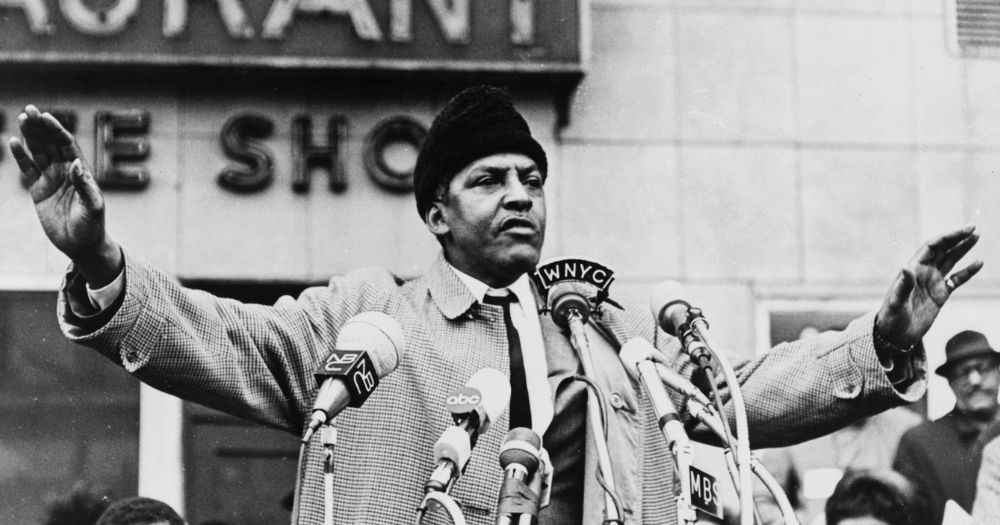The Bayard Rustin Center for Social Justice, a collective of social activists in Princeton, New Jersey, is constructing a digital archive to preserve the legacy of Bayard Rustin, a key figure in the Civil Rights Movement and coordinator of the March on Washington.
Founder and chief activist Robt Martin Seda-Schreiber spoke to the AP about why this archive, set to launch this autumn, is essential in continuing their work of advocating for social justice. “There’s this hole in our history,” Seda-Schreiber admitted. “And there are great resources about Bayard, but they’re all spread out, and none of it has been collected and put together in the way that he deserves, and more importantly, the way the world deserves to see him.”
The archive will consist of articles, photographs, videos and speeches showcasing Rustin’s career, and has been sourced from museums, archives and personal testimonies. It will be open to public submissions to ensure it continues to grow and live.
Bayard Rustin is most famous for organising the 1963 March on Washington, where Dr Martin Luther King Jr delivered his ‘I Have A Dream’ speech. Rustin acted as King’s advisor for many years after their first meeting in 1956 at the Montgomery Bus Boycotts and convinced him to adopt nonviolence as policy in the Civil Rights Movement.
His role in the Civil Rights Movement was obscured from the public from 1953 after Rustin was arrested for “lewd” and “immoral” conduct and was therefore outed as gay to the public. This, plus fabricated rumours of a sexual relationship between King and Rustin, led Rustin to take a back seat in the movement for several years.
Rustin continued to face discrimination for being openly gay; when organising the March in 1963, Strom Thurmond attacked his character in the Senate “as a homosexual”. Despite this, Rustin’s colleague Philip Randolph defended him and that September, they were both featured on the cover of Life magazine as organisers of the March.
Rustin used his voice more in support of the LGBTQ+ community in later years. In 1986, he delivered the speech ‘The New N****rs Are Gay’ on behalf of New York State’s Gay Rights Bill, where he identified gay people as “the new barometer for social change”.
The intersectional activist saw the Black and LGBTQ+ communities intertwined in their struggles for equality through his general thesis that “the human condition is of a single pattern…none of us is free and none of us can practise democracy fully so long as any other segment of the community or any country is not democratic”.
The activist was also a pioneer for how he secured legal rights for his relationship with Walter Naegle in 1982. Rustin legally adopted Naegle, 38 years his junior, and left him as executor of his estate after his death in 1987.
Naegle told NPR that “we did what we did because we loved each other, and we were happy together”. He has since set up the Bayard Rustin Fund, which raises awareness of Rustin’s work globally.
The archive will additionally follow the many endeavours honouring Rustin’s contribution to activism for the Black and LGBTQ+ communities to date. The 1997 play Civil Sex traced Bayard’s career as a civil rights activist, and Rustin was granted a posthumous Medal of Freedom from President Barack Obama in 2013. In 2020, California Governor Gavin Newsom issued a posthumous pardon for Rustin’s 1953 arrest, stating that he had been subject to discrimination by prosecutors seeking to punish LGBTQ+ people with charges like vagrancy, loitering and sodomy. Netflix released the film Rustin in 2023, produced by Barack and Michelle Obama’s company, Higher Ground.
Rustin’s legacy lives on in the Bayard Rustin Center for Social Justice, which, in addition to the archive, runs outreach programmes and offers a safe space for the queer community in New Jersey.
© 2025 GCN (Gay Community News). All rights reserved.
Support GCN
GCN is a free, vital resource for Ireland’s LGBTQ+ community since 1988.
GCN is a trading name of National LGBT Federation CLG, a registered charity - Charity Number: 20034580.
GCN relies on the generous support of the community and allies to sustain the crucial work that we do. Producing GCN is costly, and, in an industry which has been hugely impacted by rising costs, we need your support to help sustain and grow this vital resource.
Supporting GCN for as little as €1.99 per month will help us continue our work as Ireland’s free, independent LGBTQ+ media.
